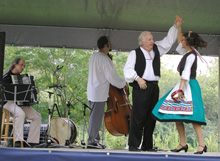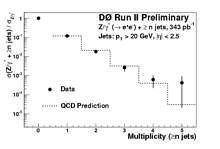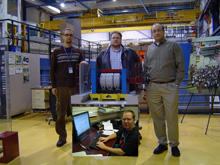 | Thursday, January 19, 2006 |
|
Thursday, January 19 |
|
Extended Forecast |
Secon Level 3 |
|
Thursday, January 19 -Tomato Florentine -Grilled Chicken Cordon Bleu Sandwich -Chimichangas -Chicken Marsala -Smoked Turkey Melt -Italian Sausage Calzones -SW Chicken Salad w/Roasted Corn Salsa |
|
Thursday, January 19
Wednesday, January 25
Chez Leon Menu |
| Fermilab Today is online at: http://www.fnal.gov/today/ Send comments and suggestions to today@fnal.gov Fermilab Today archive Hurricane Relief Page Fermilab Today PDF Version Fermilab Result of the Week archive Fermilab Safety Tip of the Week archive Linear Collider News archive Fermilab Today classifieds Subscribe/Unsubscribe to |
|
English Country Dancing: A New Activity at Fermilab |
||
|
||
|
A new dance group is getting started at the Barn in Fermilab's Village.
English country dancing will join international folk dancing and Scottish
country dancing as a recreational possibility available to the lab community as well as the
public. The first meeting of the new group will be at 2 p.m. Sunday,
January 22, and the organizers hope to continue Sunday afternoon meetings once a
month.
English country dancing is a very accessible sort of set dancing done to music for all ages and energy levels. While some of the dances date from Shakespearean times, others are new creations in a revived and ongoing tradition. The dances use many of the figures familiar to barn and contra dancing or Scottish dancing, since they are indeed related. All of the dances will be taught and walked through. Dancing will be done to recorded music, but interested musicians are encouraged to join the dancing and stay for a jam session afterwards, possibly in another location. There is no charge, but donations will be accepted. International folk dancing takes place weekly on Thursdays at 7:30 p.m. at Fermilab's Barn. Always open to newcomers, this group often begins with dances appropriate for school-age children. Later on, there is teaching of more complicated steps and request dancing. The Silk and Thistle Scottish country dancers meet every Tuesday at 7:30 p.m. to offer the lively traditional social dancing of Scotland. Newcomers are welcome and are paired with experienced dancers to help them learn. No special clothing is needed and no one needs to come with a partner. More information on English country, international folk and Scottish country dancing at Fermilab is available by calling (630) 584-0825 or (630) 840-8194 or e-mailing folkdance@fnal.gov. |
|
GLOW Brings Grids to Campus
This is the first in a series of articles about campus grids and the sciences that use them. Two years ago, a group of leading scientists from very different fields at the University of Wisconsin-Madison were in need of more computing resources. Instead of writing six different grants to fund six separate computing clusters, they joined together to create the Grid Laboratory of Wisconsin. Since then, GLOW has been used to advance research in several branches of physics, engineering, genomics and computer science.
"The computer scientists wanted to get more people involved in grid computing, and many of the researchers on campus needed more resources," says Sridhara Dasu, a particle physicist and the technical lead for GLOW. "We hoped that by pooling our talents and resources, everyone would benefit."
|
|
From The Daily Nebraskan, January 18, 2006: Physics prof brings protons to the prairie’s rural schools Many children in rural schools throughout Nebraska are never given the chance to experience university-level science like those who attend larger, urban schools. However, Ken Bloom, assistant professor of physics and astronomy at the University of Nebraska-Lincoln, is making it possible for children in rural schools to experience science in a new way. Bloom received a $550,000, five-year Faculty Early Career Development (CAREER) Program grant this year for integrating research and education. His mission is to bring physics to rural schools across Nebraska. “Rural Nebraska is a bit of a fascination for me because it’s not what I grew up with,” said Bloom, who is originally from South Orange, N.J.
Bloom’s specialty is elementary particle physics. He does research in the form of particle collision experiments at the Fermi National Accelerator Lab near Chicago. These experiments circulate protons in opposite directions at tremendous speeds in the world’s largest and most powerful accelerator, a tunnel measuring 6.2 kilometers in circumference.
|
| When a Z Boson Has Company |
|
People have always wondered what the world is made of and how it behaves. Over the past three decades, physicists have developed a theory, called the Standard Model, that describes all matter and forces in the universe (except gravity). In the Standard Model, all matter is composed of quarks (which are the constituents of, for example, protons and neutrons) and leptons (the electron being one of them). Quarks and leptons are assumed to be fundamental objects, and all their interactions are mediated by force carriers called bosons, with the Z boson being the heaviest carrier of the electroweak force.
DZero has studied the products of extremely hard collisions between protons and their antimatter counterparts, antiprotons, at the Tevatron Collider. On rare occasions, the debris from such collisions contains a Z boson in association with jets; it took tens of trillions of proton-antiproton collisions to catch just two candidate events containing a Z boson accompanied by 5 jets! The jets are seen as collimated sprays of particles; they are the experimental signatures of high-energy quarks and gluons produced in the proton-antiproton collision. The Z boson can be distinctly identified via its decay into electron-positron pairs. Our measurement of the production rate (or cross section) of a Z boson with jets over a range of jet multiplicities is shown in the figure and is found to be in agreement with the Standard Model prediction. This result provides a deeper understanding of Quantum Chromodynamics (QCD), the theory that describes strong interactions among elementary particles, and of phenomenological models that provide computer simulations of high energy particle collisions. In addition, the production of a Z boson accompanied by jets forms a "background" to our searches for other interesting physics processes (such as the production of Higgs bosons or particles beyond the Standard Model). Our measurements provide a benchmark for such searches in the future. |
| Result of the Week Archive
|
|
January 13 - 18 - A store established previously provided the experiments with 11 hours and 45 minutes of luminosity. - Tevatron quench causes vacuum problems, that will could keep the Tev off for 2 weeks. Read the Current Accelerator Update Read the Early Bird Report View the Tevatron Luminosity Charts
|
|
|
NALWO Slideshow National Laboratory Women's Association slideshow and luncheon will take place on January 23, 2006 from 11:00 a.m. until 1:00 p.m. in the Users Center Music Room. The topic is "Brazil and Argentina." We'll have lunch together after the slide talk, so bring a sack lunch. Beverages and desserts will be provided. Lab women, guests, visitors, users and employees are welcome. For additional information, contact: Cynthia Albright at 630/208-8010; cynalbr@earthlink.net or the Housing Office at 630/840-3777; housing@fnal.gov.
Weight Watchers
|



